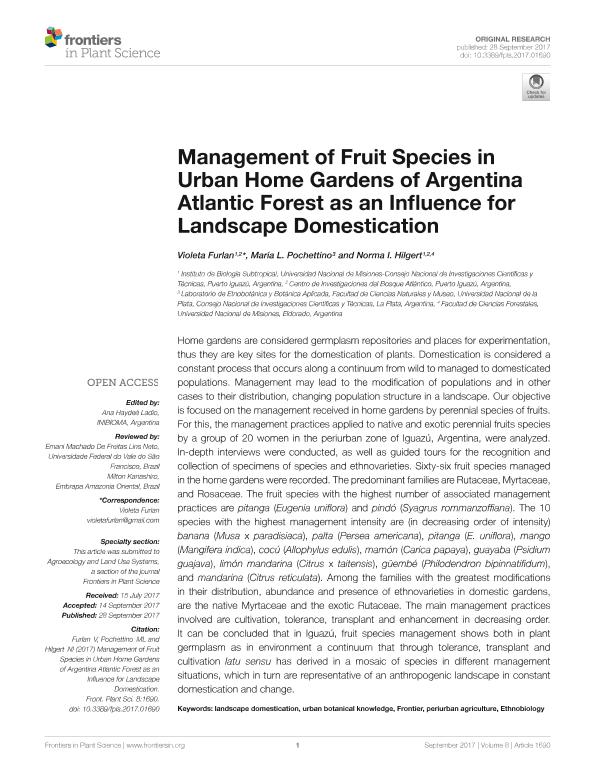Mostrar el registro sencillo del ítem
dc.contributor.author
Furlan, Violeta

dc.contributor.author
Pochettino, María Lelia

dc.contributor.author
Hilgert, Norma Ines

dc.date.available
2018-05-22T21:38:01Z
dc.date.issued
2017-09
dc.identifier.citation
Furlan, Violeta; Pochettino, María Lelia; Hilgert, Norma Ines; Management of fruit species in urban home gardens of Argentina Atlantic Forest as an influence for landscape domestication; Frontiers Research Foundation; Frontiers in Plant Science; 8; 1690; 9-2017; 1-12
dc.identifier.uri
http://hdl.handle.net/11336/45967
dc.description.abstract
Home gardens are considered germplasm repositories and places for experimentation, thus they are key sites for the domestication of plants. Domestication is considered a constant process that occurs along a continuum from wild to managed to domesticated populations. Management may lead to the modification of populations and in other cases to their distribution, changing population structure in a landscape. Our objective is focused on the management received in home gardens by perennial species of fruits. For this, the management practices applied to native and exotic perennial fruits species by a group of 20 women in the periurban zone of Iguazú, Argentina, were analyzed. In-depth interviews were conducted, as well as guided tours for the recognition and collection of specimens of species and ethnovarieties. Sixty-six fruit species managed in the home gardens were recorded. The predominant families are Rutaceae, Myrtaceae, and Rosaceae. The fruit species with the highest number of associated management practices are pitanga (Eugenia uniflora) and pindó (Syagrus rommanzoffiana). The 10 species with the highest management intensity are (in decreasing order of intensity) banana (Musa x paradisiaca), palta (Persea americana), pitanga (E. uniflora), mango (Mangifera indica), cocú (Allophylus edulis), mamón (Carica papaya), guayaba (Psidium guajava), limón mandarina (Citrus x taitensis), güembé (Philodendron bipinnatifidum), and mandarina (Citrus reticulata). Among the families with the greatest modifications in their distribution, abundance and presence of ethnovarieties in domestic gardens, are the native Myrtaceae and the exotic Rutaceae. The main management practices involved are cultivation, tolerance, transplant and enhancement in decreasing order. It can be concluded that in Iguazú, fruit species management shows both in plant germplasm as in environment a continuum that through tolerance, transplant and cultivation latu sensu has derived in a mosaic of species in different management situations, which in turn are representative of an anthropogenic landscape in constant domestication and change.
dc.format
application/pdf
dc.language.iso
eng
dc.publisher
Frontiers Research Foundation

dc.rights
info:eu-repo/semantics/openAccess
dc.rights.uri
https://creativecommons.org/licenses/by-nc-sa/2.5/ar/
dc.subject
Ethnobiology
dc.subject
Frontier
dc.subject
Landscape Domestication
dc.subject
Periurban Agriculture
dc.subject
Urban Botanical Knowledge
dc.subject.classification
Otras Ciencias Biológicas

dc.subject.classification
Ciencias Biológicas

dc.subject.classification
CIENCIAS NATURALES Y EXACTAS

dc.title
Management of fruit species in urban home gardens of Argentina Atlantic Forest as an influence for landscape domestication
dc.type
info:eu-repo/semantics/article
dc.type
info:ar-repo/semantics/artículo
dc.type
info:eu-repo/semantics/publishedVersion
dc.date.updated
2018-05-17T14:48:25Z
dc.identifier.eissn
1664-462X
dc.journal.volume
8
dc.journal.number
1690
dc.journal.pagination
1-12
dc.journal.pais
Suiza

dc.description.fil
Fil: Furlan, Violeta. Consejo Nacional de Investigaciones Científicas y Técnicas. Centro Científico Tecnológico Conicet - Nordeste. Instituto de Biología Subtropical. Instituto de Biología Subtropical - Nodo Puerto Iguazú | Universidad Nacional de Misiones. Instituto de Biología Subtropical. Instituto de Biología Subtropical - Nodo Puerto Iguazú; Argentina. Centro de Investigaciones del Bosque Atlántico; Argentina
dc.description.fil
Fil: Pochettino, María Lelia. Consejo Nacional de Investigaciones Científicas y Técnicas; Argentina. Universidad Nacional de La Plata. Facultad de Ciencias Naturales y Museo. Laboratorio de Etnobotánica y Botánica Aplicada; Argentina
dc.description.fil
Fil: Hilgert, Norma Ines. Facultad de Ciencias Naturales y Museo, Universidad Nacional de la Plata; Argentina. Consejo Nacional de Investigaciones Científicas y Técnicas. Centro Científico Tecnológico Conicet - Nordeste. Instituto de Biología Subtropical. Instituto de Biología Subtropical - Nodo Puerto Iguazú | Universidad Nacional de Misiones. Instituto de Biología Subtropical. Instituto de Biología Subtropical - Nodo Puerto Iguazú; Argentina
dc.journal.title
Frontiers in Plant Science
dc.relation.alternativeid
info:eu-repo/semantics/altIdentifier/url/https://www.ncbi.nlm.nih.gov/pmc/articles/PMC5625568/
dc.relation.alternativeid
info:eu-repo/semantics/altIdentifier/doi/http://dx.doi.org/10.3389/fpls.2017.01690
dc.relation.alternativeid
info:eu-repo/semantics/altIdentifier/url/https://www.frontiersin.org/articles/10.3389/fpls.2017.01690/full
Archivos asociados
